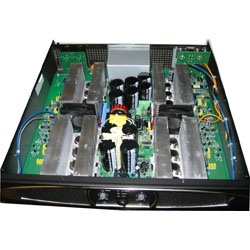Do you really care if the power amplifier you’re using is a MOSFET (Metal Oxide Semiconductor Field Effect Transistors) or Bipolar design?
Probably not, at least as long as the amplifier continues to perform.
With modern amplifiers, few people notice the difference between the designs until the amp fails and they receive the repair bill. That’s when most people take a special notice.
Keeping that in mind, let’s walk through some of the advantages, disadvantages and myths of these two designs.
Back On The Loud Frontier
For many years now, designers and users of professional amplifiers have had the same discussions (arguments) regarding which output devices sound or perform better.
Unfortunately, these discussions have created more myths than factual statistics.
When talking about Bipolar or MOSFET designs, we are usually talking about the output stage of an amplifier.
The output stage can be compared to the engine of a car. The output stage provides the horsepower to the speaker.
The differences between the two design approaches for this topic have very little to do with front end designs or power supplies.
Engineers of the 1960s and 1970s were frontiersmen of high power silicon for audio. Most of their success in amplifier design was based on the guinea pig method. Stand back and watch for smoke!
They didn’t have many textbooks for amp designs or the Internet to print off the latest findings.
Their designs were not always successful due to unproven engineering and inadvertently created modern misunderstandings about MOSFET and Bipolar transistors.
Bipolar designs have been around since the 1960s, when silicon evolution led us astray from the common tube designs. The majority of professional amplifiers in the market, past and present, are of the bipolar topology.
The sound quality of a bipolar design is what we have become acquainted with. Unfortunately, this does not mean that all bipolar amplifiers sound good.















